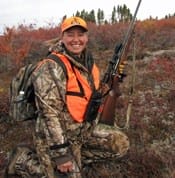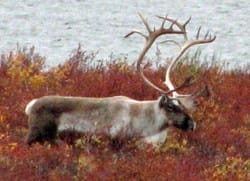 Anyone who thinks hunting is a man’s sport never met Barbara Ries, a hardworking member of IAMAW local 1886 with more hunting experience, backwoods knowledge and pure dedication to the outdoors than most sportsmen.
Anyone who thinks hunting is a man’s sport never met Barbara Ries, a hardworking member of IAMAW local 1886 with more hunting experience, backwoods knowledge and pure dedication to the outdoors than most sportsmen.
Growing up on a Colorado farm, Ries spent her childhood hunting, fishing and camping with her family. “We owned mules and donkeys, so we did a lot of Rocky Mountain pack-ins,” Ries said. “I was considered ‘dad’s little wrangler.’” One of the family’s traditions is hunting elk with muzzleloaders together. Even when six months along with her second child, Ries headed into the Rockies with her family, determined not to let pregnancy keep her from the annual hunt.
Hunting, fishing, farming and passing her outdoor knowledge on to her children keep Ries busy on the weekends when a lot of hunting and fishing programs are on television. So she was not aware that, as a union member, she could apply for Escape to the Wild, a program of the Theodore Roosevelt Conservation Partnership (TRCP), VERSUS Network and several trade unions and contractor associations that takes hardworking union members on the hunting or fishing trip of a lifetime. Her brother, Paul, nominated her for the show, knowing she would “just go crazy” if chosen to take a floatplane to a drop-camp location for the chance to hunt caribou.
On the job, Ries is a ramp service employee for United Airlines, responsible for training employees to de-ice planes. She is also a volleyball coach and a board member for the Adams County Fair Livestock Committee. Escape to the Wild host, Tom Ackerman, took Ries by surprise when he posed as a livestock buyer at the county fair to whisk her off to Mackay Lake Lodge in the Northwest Territories for the hunt of her life.
Accustomed to the rugged backcountry of the American west, Ries was still amazed by the challenging weather and pristine beauty of the Northwest Territories. Reaching the caribou entailed a grueling 25 mile boat ride in freezing temperatures. “It was an hour and a half going out and coming back in really rough water with really cold water spraying in our faces. It was cold, cold, cold,” Ries recounts. But when Ackerman told Ries that “if it got to be too much, they could go back,” the determined sportswomen responded “this is hunting. This is part of the experience.”
 Braving the conditions paid off when Ries, Ackerman and their guide found themselves in the midst of thousands of migrating caribou. “A group of cows and calves came within about 40 yards of us,” Ries said. Her heavy jacket still in the boat, Ries started to get cold but thought “I’m not getting up. This is just too phenomenal.” And as the cold began to take its toll on the group, the bulls came, following the cows.
Braving the conditions paid off when Ries, Ackerman and their guide found themselves in the midst of thousands of migrating caribou. “A group of cows and calves came within about 40 yards of us,” Ries said. Her heavy jacket still in the boat, Ries started to get cold but thought “I’m not getting up. This is just too phenomenal.” And as the cold began to take its toll on the group, the bulls came, following the cows.
For Ries, hunting caribou was one of many incredible aspects of trip. “To get up on a hill and look out and see 30 miles of nothing, no human intervention, was amazing,” she said. “We were also honored with a ceremonial drum dance. The natives have great respect for the animals and wanted to share their heritage.” Just as Ries’ brother expected, she found the entire experience “absolutely amazing.”



